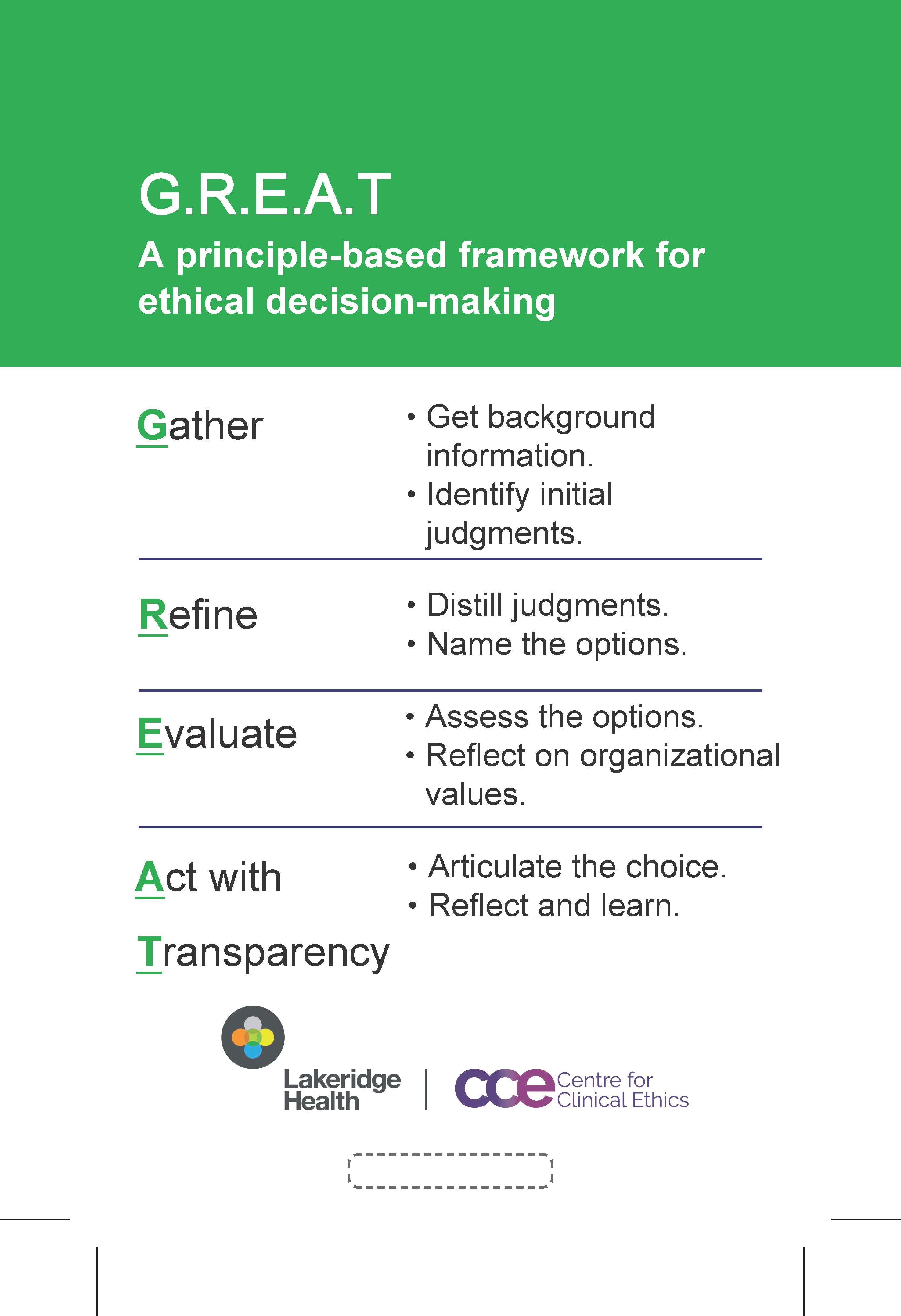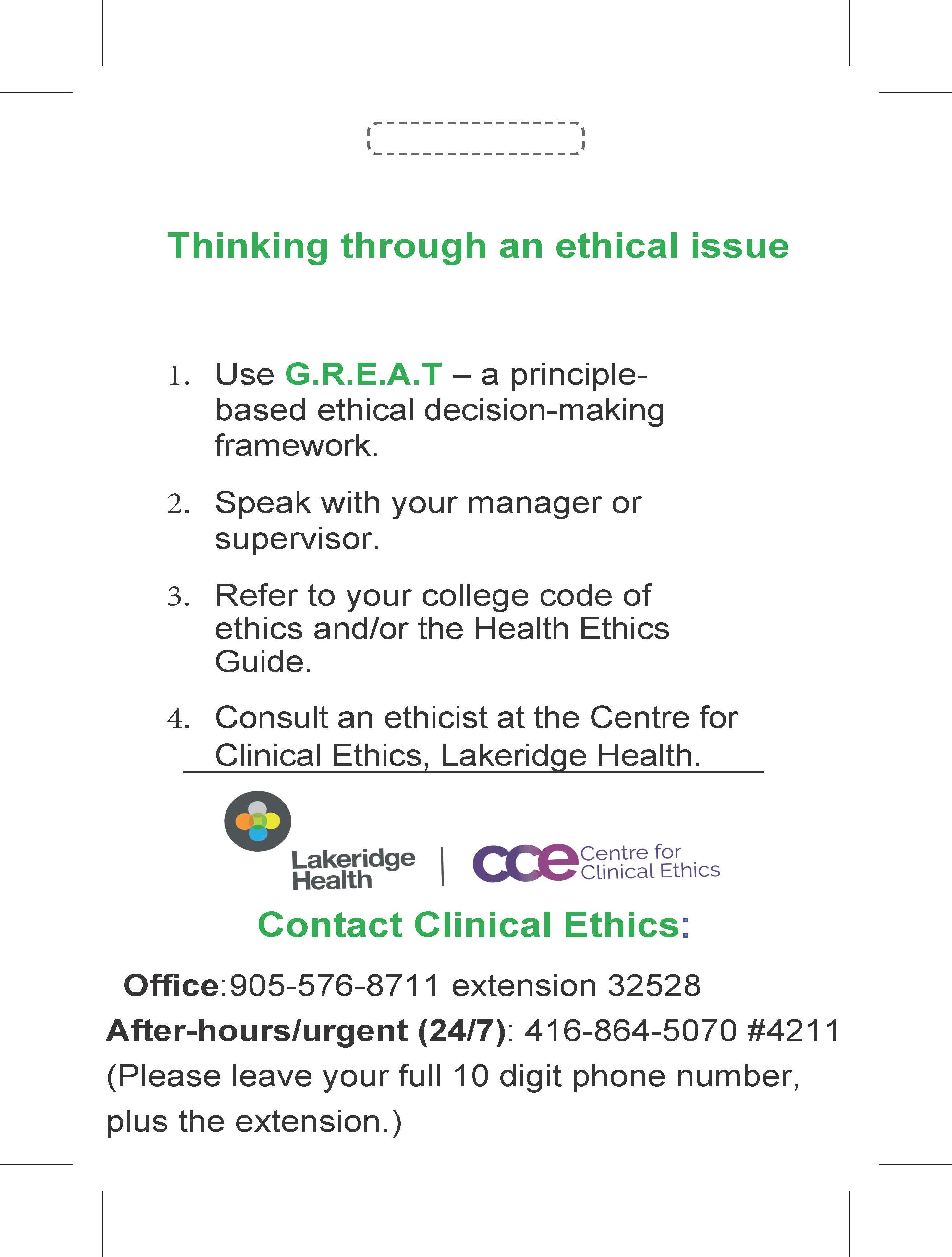Ethics
Welcome to the Centre for Clinical Ethics
We provide consultative services to patients, families, hospital staff, volunteers and students on a wide range of ethical issues across the life-span. Frequently encountered issues include value conflicts around decisions, such as withholding or withdrawing treatment; consent and capacity; resource allocation; and organizational ethics.
What is Ethics?
Ethics is the study of right and wrong, the ‘grey’ areas in between, and the reasons and justifications for our actions. Clinical ethics is the application of ethics to healthcare contexts. The role of a clinical ethics service is to help facilitate sound ethical decision-making, by bringing stakeholders’ voices to the table, and identifying and respecting the needs of patients, families, and healthcare staff. In some cases, we are faced with a choice between a few different options, each with their own benefits and challenges. In these cases, clinical ethics promotes reflective practice and can help stakeholders reach justifiable decisions with which they are comfortable.
Ethics Consultation Services:
- Case consultations: one-on-one w/ any stakeholder; attendance at team & family meetings
- Support: one-on-one confidential
- Preventive ethics: education (e.g. in-services, lunch & learns, Ethics Grand Rounds), attendance at clinical rounds/huddles
- Retrospective case/issues analysis: confidential debriefs on cases or issue clusters, case reviews, publications and case studies
- Organizational issues support: some tools used are the Accountability for Reasonableness Framework or A4R (in tandem with YODA); and a weighted decision-making matrix for guiding deliberations and measuring potential options
-
Behaviour agreement development and implementation: relationship plans between healthcare teams and patients and/or family, and guidance on how to enact them well
- Committees and Working Groups: development and/or participation
- Policy/guideline/document review and development
- Debriefs: confidential group sessions to facilitate team decompression, promote solidarity, problem-solve, and analyze tough cases
- Education
- Research
- Research protocol reviews: sitting on Research Ethics Boards
- Documentation of process, outcome & trends: consult numbers, sites, roles requesting, recurrent issues, follow-up activities
Ethical Decision-making:

Principles
Autonomy, beneficence, non-maleficence, justice etc.
Lakeridge Health Values
Inclusion, Compassion, Innovation, Teamwork, Joy
Ethical Dilemmas occur when these and/or other principles/values come into conflict.
G.R.E.A.T: Principle-based Ethical Decision-making Framework
Gather
Refine
Evaluate
Act with Transparency

Some Common issues:
- Substitute decision-making
- Decision-making capacity
- Communication difficulties
- Informed consent & informed refusal
- Level of care
Ethicists are not:
- Arbiters of right and wrong
- Legal or Risk
- Watchdogs
When to call the Centre?
If you are facing a difficult situation and are unsure of the best course of action, we may be able to assist. Not sure what we “should” be doing? Not certain what the “right” course of action is? Feel like we are not doing the “right” thing? Are you or a staff/patient/family member struggling with a decision? Anyone can trigger an ethics consult…feel free, no need to hesitate!
How to Reach Us (24/7 support):
- Locating “0” or #33200
- Epic secure chat (follow-up by phone if no same-day response)
- On-site Ethicist ext. 32528 or cell: 647.200.9772 during regular business hours, also by email v.shillman@lh.ca
- CCE office (business hours if not on-site or not reachable in office) 416.530.6750
- On-call pager (for after-hours or urgent requests - leave FULL number including extension!) 416.864.5070 - ID #4211
More Information
The Centre for Clinical Ethics has developed a series of brochures for health care consumers and providers on the following topics:
- Advanced Care Planning
- Capacity Assessment
- Informed Consent to Treatment
- Power of Attorney for Personal Care
- Substitute Decision Making
Additionally, here are some useful decisional tools:

